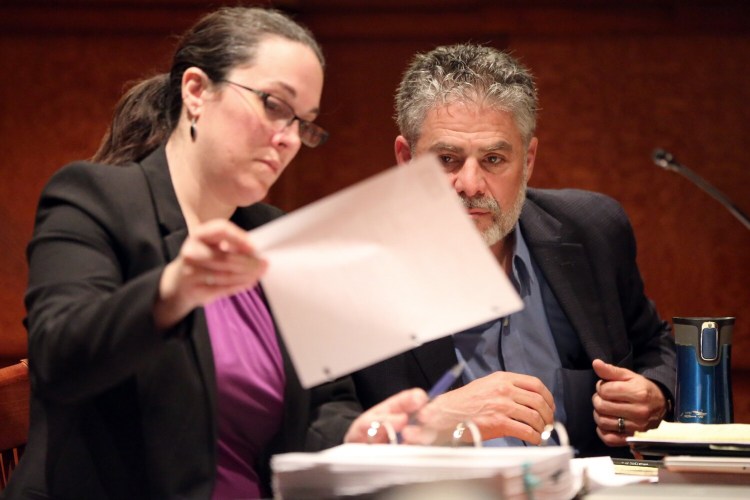Former Portland Mayor Ethan Strimling said Tuesday that his landlord targeted him for eviction for his involvement in a newly formed tenants union, while the landlord, Geoffrey Rice, said he felt Strimling was trying to “nickel and dime” him, but that he was too intimidated to push back.
Strimling, mayor from 2015 to 2019, said during a summary proceeding in Cumberland County District Court that he once had a good relationship with his landlord at the Trelawny Building at 655 Congress St. But he said he also remains passionate about tenants’ rights, and that after he got involved in organizing the tenants union, his landlord retaliated.
“It felt like it was clear when I walked out of that meeting that I was being targeted,” Strimling said of a May 25, 2021, sit-down with Rice and Rice’s attorney, Paul S. Bulger.
The court hearing Tuesday was the latest development in the case, which dates back to a written notice of termination and notice to quit issued against Strimling last year that he has fought in court. Strimling has argued that the building owner is engaging in a retaliatory eviction in violation of the First Amendment and the Maine Constitution. Judge Susan Oram said she is weighing the evidence and will issue a written decision as quickly as possible.
Rice, who owns and manages several rental properties across the city, countered, saying Strimling pushed back on small annual rent increases more than once, and that he felt the former mayor, who moved into the building in 2016, was trying to “nickel and dime” him.
“I felt intimidated,” Rice told the court. “However, I realized he was the mayor and he could cause me aggravation from the city.”
Rice said he finally decided to issue an eviction notice to Strimling after he left a window open in April 2021 in violation of a clause in his lease that says tenants may not leave windows open during the heating season because the landlord pays for the heat. He later called the May 25 meeting with his lawyer, he said, after Strimling asked to discuss the situation and said he would wait to hear from Rice before paying a $50 fine for the infraction.
The meeting was a central focus of Tuesday’s hearing. Rice said the landlord-tenant relationship had broken down by then to a point that he wanted to end the arrangement by giving Strimling a notice of non-renewal and a little over one month to vacate the apartment.
Strimling and his attorney, Scott Dolan, said the meeting appeared to have been called in response to communication the newly formed Trelawny Tenants Union had sent Rice and his management team with questions about lease renewals and the potential sale of the building.
After receiving the communication from the union, which was signed by 47 tenants and emailed with a 9:44 a.m. time stamp, Rice wrote to Strimling, saying he received his “email at 9:44 a.m. this morning” and would like them to meet with Bulger.
“What makes this letter a smoking gun, is that it’s so precise,” Dolan said. “It references the exact time of the email at 9:44 a.m. What’s so revealing about that is Mr. Strimling did not email Mr. Rice at 9:44 a.m. That email Mr. Rice was referring to was the first communication from the Trelawny Tenants Union to Mr. Rice.”
Strimling said most of the meeting was spent talking about the tenants union’s concerns and a new rent control ordinance approved by voters in 2020. Strimling also said Rice told him he needed to evict some residents, including Strimling, to bring the rents of certain apartments closer to market rate and “get the five percent bump” that the ordinance allows for a rent increase when a new tenant occupies a unit.
“I have somewhat of a profile – and I think if you’re able to evict somebody like me, imagine what might happen to someone else in the building without the ability to fight back or who doesn’t understand the systems to fight back,” Strimling said. “When I walked out of that meeting and they told me I was being evicted because they wanted that five percent bump … it doesn’t make sense.”
David Chamberlain, attorney for Rice, told the court the decision to evict Strimling wasn’t retaliatory and came amid broader economic challenges for the landlord.
“His tax increase was $89,000 – that was on the horizon as he was making decisions on which tenants he was going to maintain. …” Chamberlain said. “Then we had the intervention of COVID and … rent control voted in in November 2020 and effective Jan. 1.”
This February, the Portland Rent Board heard a case from the tenants union in Strimling’s building. The members asked the board to reduce and reallocate a tax-rate-based rent increase from Rice that they said they’d been notified about in November. They said it didn’t accurately reflect the actual amount of taxes the building paid and hadn’t been correctly divided between residents, commercial space and Rice’s own apartment in the building. They also asked the board to impose more than $100,000 in fines on Rice for previous violations of the rent control ordinance.
The board ruled that the property-tax-rate-based rent adjustment should be allocated based on the square footage of each unit, rather than applied uniformly, and recommended that Rice be fined $15,300 for improperly distributing rent increase notices in November and December.
Rice appealed the rent board’s decision last month, arguing that the board failed to allow for public comment at its Feb. 9 meeting, and assumed notices to tenants were “defective” without a finding of fact. The appeal also said the city’s rent control ordinance as written is vague and led to confusion on the board.
Send questions/comments to the editors.




Comments are no longer available on this story